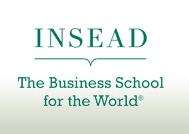INSEAD, The Business School for the World, in partnership with InTent, will lead two panel discussions at the Sustainable Development Goals (SDG) Tent from 22-26 May, alongside the World Economic Forum in Davos, Switzerland.
Hosted by the INSEAD Hoffmann Global Institute for Business and Society (Hoffmann Institute), the sessions will convene faculty, distinguished speakers and experts, with attendees consisting of international business community, policymakers, leading voices in civil society, investors, entrepreneurs and CEOs to explore sustainable solutions in line with the United Nations (UN) SDGs.
Aligned with Davos’ theme of Working Together, Restoring Trust, the INSEAD sessions Renewable Energy, Scarcity and Circularity: A Path to Net Zero and Good for Business, Business for Good, aim to advance the conversation and press the agenda towards the most important dialogues of our time.
Atalay Atasu, INSEAD Professor of Technology and Operations Management, will lead the first session. Together with Georgina Grenon, Sustainability Director Paris 2024, Michele Crisostomo, Chair of the Board of Directors and Chairman, Corporate Governance and Sustainability Committee, Enel Spa, Italy, and Guillaume Pitron, Journalist, the session will discuss how the path to Net Zero heavily relies on a successful transition to renewable energy. Topics include the role of scarce materials and the industrial circular economy transition; and how governments and policymakers can help.
According to Professor Atasu, “In the absence of a well-crafted transition plan that focuses on material flow security required for the renewable energy transition, we could be hampering the feasibility of a key component of climate change mitigation strategies. It is time for businesses and policy makers to consider different facets of the sustainable development paradigm to provide stronger foundations for this critical transition. One crucial aspect will be realizing the interdependencies of technology choice, material scarcity, global competition and policy.”
Morten Bennedsen, INSEAD Professor of Economics, Andre Hoffmann, Vice Chairman of Roche, founder of InTent and patron of the INSEAD Hoffmann Global Institute for Business and Society, Katell Le Goulven, Executive Director of the Hoffmann Global Institute for Business and Society, and Suni P. Harford, President of UBS Asset Management, will lead a special dialogue on how family businesses can be catalysts for change and a driving force for the progress of society and planet.
Professor Bennedsen said, “Family-owned businesses have a unique potential for being change makers through exercising long term business strategies, value based leadership models and engaging in philanthropy and impact investment. However, the fulfillment of this potential requires key individuals’ commitment to engaging in broader issues.”
Being at the centre of these crucial dialogues will also enable the school to refine its approach and align its work and research even closer with the SDGs to offer innovative and transformative business education.
Katell Le Goulven said, “Our aim at Davos as a management education research leader is to leverage upon research and knowledge to inform business world efforts. By leading timely conversations on the role of circularity to achieve a net zero economy or on the unique potential of family businesses to act as a force for good, the Hoffmann Institute strives to explore the intersection of business and society and to drive alignment with the SDGs.”
Andre Hoffmann added, “To build a fair and sustainable future for people and planet, we need to accelerate solutions by building bridges and connecting people. The SDG Tent at Davos is an ideal platform for all stakeholders to access and be part of informed conversations and innovative solutions to create a sustainable future for all.”
Peter Zemsky, Deputy Dean of INSEAD and Andre Hoffmann will also join in the Financial Times’ session to discuss the future of responsible business education.
Register here to join in the INSEAD sessions.

